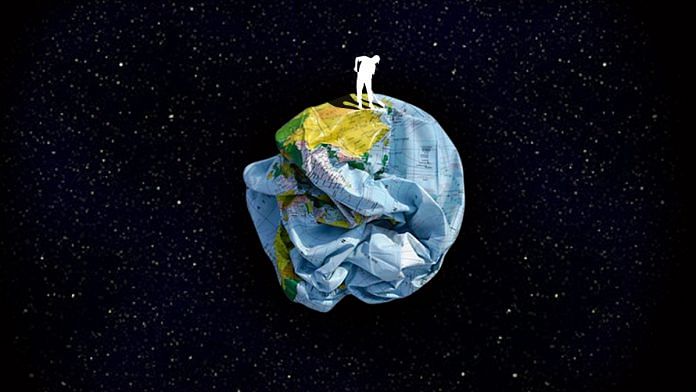Setting aside escapist solutions, we should understand why corrective action has not followed better understanding of the climate problem.
Every warning that humankind is overloading Earth’s environment and risking dire consequences has been accompanied by exhortations to change the way in which humankind lives, and followed by action plans with targets. From the Club of Rome report in 1972 to the Rio Summit in 1992, and from the Kyoto Protocol in 1997 to the Paris agreement of 2015, a variety of dire warnings have been held out and goals set for changing course. All to no effect. Humankind has gone on pretty much as before.
 By the 1990s, humankind’s ecological footprint exceeded for the first time Earth’s capacity to bear. It’s only got worse since then. The reality of extreme and unpredictable weather is now upon us. Fresh exhortations accompany the latest set of even direr warnings by scientists, with the added urgency of a shortened deadline that is barely a decade away. But environmental destruction was hard-coded into the way Cro-Magnon man progressed from being “another species of large mammal” to global conquest. As Jared Diamond noted in The Rise and Fall of the Third Chimpanzee, “The juggernaut of destruction has already reached unstoppable momentum”. That was in 1991.
By the 1990s, humankind’s ecological footprint exceeded for the first time Earth’s capacity to bear. It’s only got worse since then. The reality of extreme and unpredictable weather is now upon us. Fresh exhortations accompany the latest set of even direr warnings by scientists, with the added urgency of a shortened deadline that is barely a decade away. But environmental destruction was hard-coded into the way Cro-Magnon man progressed from being “another species of large mammal” to global conquest. As Jared Diamond noted in The Rise and Fall of the Third Chimpanzee, “The juggernaut of destruction has already reached unstoppable momentum”. That was in 1991.
Also read: Nobel committee rewarded the right kind of economics this year
Since DNA is hard to change, we should assume that the future will be a repeat of the past (many exhortations, but little or no action). The realist will get prepared for the predicted rises in temperature and associated disasters, like the unprecedented elimination of millions of species — all part of the food chain. But how does one get prepared for global disaster? Perhaps by figuring out which areas will get hit earlier or worse than others.
A recent report said the wealthy are acquiring second (or third) homes in New Zealand, in the belief that deep down under will be a safe place to hide. But New Zealand is a tiny place that does not want many migrants, and barriers to stop poorer migrants (many of them environmental refugees) are going up everywhere, including in India. Conflict is embedded in the situation.
SpaceX’s Elon Musk thinks becoming a multi-planet species, and setting up colonies in places like Mars, would provide insurance in the event of World War III (some would argue that the environmental sphere is indeed witnessing just such a war). But inter-planetary travel and life in inherently hostile environments are more suited for bionic creatures capable of being purpose-designed and with replaceable parts, not humankind.
Setting aside escapist solutions, we should at least understand why corrective action has not followed better understanding of the problem and its growing urgency. First, the environment conferences were designed like trade negotiations: What one country commits to depends on what the other country offers in the talks. It has worked (until recently) with trade, because freer trade has usually been win-win. With the environment, it has failed because it was seen as zero-sum. The wealthy have not been willing to change their lifestyles in order to create environmental space for the poor to improve their livelihoods.
Second, the danger warnings were set to flash way into the future, for the year 2050 or 2100, dates well beyond decision-makers’ life spans. Most voters have more urgent concerns, especially at a time of disruptive change. Third, the link between action and result has been too diffuse to register. Or, cause and effect relate to different people: The farmer who burns his crop stubble in Punjab cares not a whit for the poisonous air breathed in Delhi — just one example of how the polluter does not pay. And fourth, technological fixes like more fuel-efficient engines are no solution because, perversely, they encourage more consumption.
Also read: Ganga crusader GD Agrawal, on fast since 22 June, dies in Haridwar
Does a change in economic thinking offer a solution? The Nobel committee has just tried that, by honouring William Nordhaus. On the other hand, G.D.Agrawal has just fasted to death for the Ganga. In the final analysis, we can keep drawing on our natural wealth accumulated over millennia, like an inherited bank balance, only so long as there is something left in the account. The day comes when, quite suddenly, there is no balance left to draw. Make no mistake, that is where we are headed.
By Special Arrangement with Business Standard.



